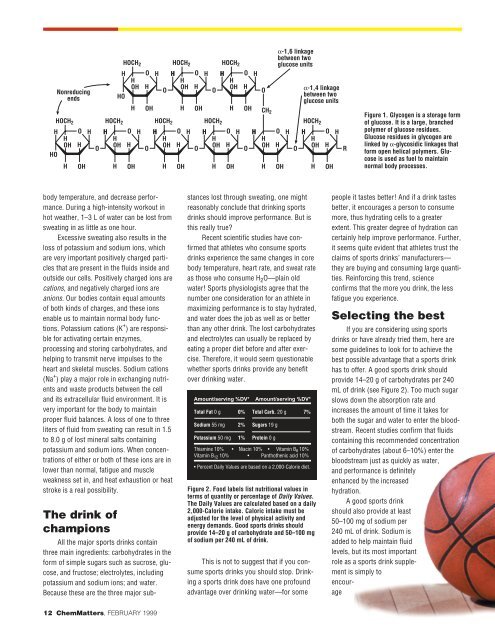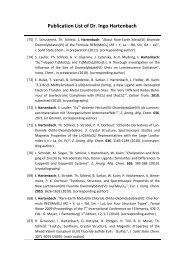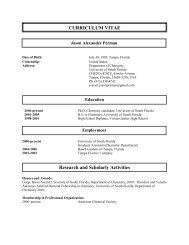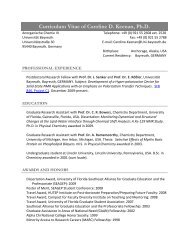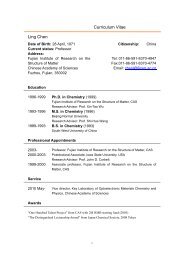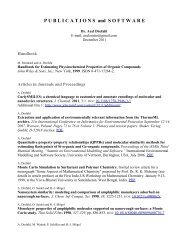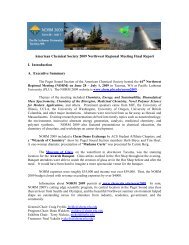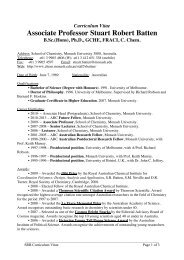Sports Drinks: Don't Sweat the Small Stuff - American Chemical ...
Sports Drinks: Don't Sweat the Small Stuff - American Chemical ...
Sports Drinks: Don't Sweat the Small Stuff - American Chemical ...
You also want an ePaper? Increase the reach of your titles
YUMPU automatically turns print PDFs into web optimized ePapers that Google loves.
H<br />
HO<br />
Nonreducing<br />
ends<br />
HOCH 2<br />
O H H<br />
H<br />
OH H<br />
O<br />
H<br />
OH<br />
body temperature, and decrease performance.<br />
During a high-intensity workout in<br />
hot wea<strong>the</strong>r, 1–3 L of water can be lost from<br />
sweating in as little as one hour.<br />
Excessive sweating also results in <strong>the</strong><br />
loss of potassium and sodium ions, which<br />
are very important positively charged particles<br />
that are present in <strong>the</strong> fluids inside and<br />
outside our cells. Positively charged ions are<br />
cations, and negatively charged ions are<br />
anions. Our bodies contain equal amounts<br />
of both kinds of charges, and <strong>the</strong>se ions<br />
enable us to maintain normal body functions.<br />
Potassium cations (K + ) are responsible<br />
for activating certain enzymes,<br />
processing and storing carbohydrates, and<br />
helping to transmit nerve impulses to <strong>the</strong><br />
heart and skeletal muscles. Sodium cations<br />
(Na + ) play a major role in exchanging nutrients<br />
and waste products between <strong>the</strong> cell<br />
and its extracellular fluid environment. It is<br />
very important for <strong>the</strong> body to maintain<br />
proper fluid balances. A loss of one to three<br />
liters of fluid from sweating can result in 1.5<br />
to 8.0 g of lost mineral salts containing<br />
potassium and sodium ions. When concentrations<br />
of ei<strong>the</strong>r or both of <strong>the</strong>se ions are in<br />
lower than normal, fatigue and muscle<br />
weakness set in, and heat exhaustion or heat<br />
stroke is a real possibility.<br />
The drink of<br />
champions<br />
HOCH 2<br />
All <strong>the</strong> major sports drinks contain<br />
three main ingredients: carbohydrates in <strong>the</strong><br />
form of simple sugars such as sucrose, glucose,<br />
and fructose; electrolytes, including<br />
potassium and sodium ions; and water.<br />
Because <strong>the</strong>se are <strong>the</strong> three major sub-<br />
12 ChemMatters, FEBRUARY 1999<br />
H<br />
HO<br />
HOCH 2<br />
O H H<br />
H<br />
OH H<br />
O<br />
H<br />
OH<br />
O H H<br />
H<br />
OH H<br />
O<br />
H OH<br />
HOCH 2<br />
HOCH 2<br />
O H H<br />
H<br />
OH H<br />
O<br />
H OH<br />
O H H<br />
H<br />
OH H<br />
O<br />
H OH<br />
HOCH 2<br />
HOCH 2<br />
O<br />
H<br />
OH H<br />
H OH<br />
stances lost through sweating, one might<br />
reasonably conclude that drinking sports<br />
drinks should improve performance. But is<br />
this really true?<br />
Recent scientific studies have confirmed<br />
that athletes who consume sports<br />
drinks experience <strong>the</strong> same changes in core<br />
body temperature, heart rate, and sweat rate<br />
as those who consume H 2O—plain old<br />
water! <strong>Sports</strong> physiologists agree that <strong>the</strong><br />
number one consideration for an athlete in<br />
maximizing performance is to stay hydrated,<br />
and water does <strong>the</strong> job as well as or better<br />
than any o<strong>the</strong>r drink. The lost carbohydrates<br />
and electrolytes can usually be replaced by<br />
eating a proper diet before and after exercise.<br />
Therefore, it would seem questionable<br />
whe<strong>the</strong>r sports drinks provide any benefit<br />
over drinking water.<br />
This is not to suggest that if you consume<br />
sports drinks you should stop. Drinking<br />
a sports drink does have one profound<br />
advantage over drinking water—for some<br />
H<br />
O H H<br />
H<br />
OH H<br />
O<br />
H OH<br />
O<br />
CH 2<br />
O H H<br />
H<br />
OH H<br />
O<br />
H OH<br />
α-1,6 linkage<br />
between two<br />
glucose units<br />
Amount/serving %DV* Amount/serving %DV*<br />
Total Fat 0 g 0% Total Carb. 20 g 7%<br />
Sodium 55 mg 2% Sugars 19 g<br />
Potassium 50 mg 1% Protein 0 g<br />
Thiamine 10% • Niacin 10% • Vitamin B 6 10%<br />
Vitamin B 12 10% • Pantho<strong>the</strong>nic acid 10%<br />
• Percent Daily Values are based on a 2,000-Calorie diet.<br />
HOCH 2<br />
Figure 2. Food labels list nutritional values in<br />
terms of quantity or percentage of Daily Values.<br />
The Daily Values are calculated based on a daily<br />
2,000-Calorie intake. Caloric intake must be<br />
adjusted for <strong>the</strong> level of physical activity and<br />
energy demands. Good sports drinks should<br />
provide 14–20 g of carbohydrate and 50–100 mg<br />
of sodium per 240 mL of drink.<br />
α-1,4 linkage<br />
between two<br />
glucose units<br />
O<br />
H<br />
OH H<br />
H OH<br />
H<br />
R<br />
Figure 1. Glycogen is a storage form<br />
of glucose. It is a large, branched<br />
polymer of glucose residues.<br />
Glucose residues in glycogen are<br />
linked by α-glycosidic linkages that<br />
form open helical polymers. Glucose<br />
is used as fuel to maintain<br />
normal body processes.<br />
people it tastes better! And if a drink tastes<br />
better, it encourages a person to consume<br />
more, thus hydrating cells to a greater<br />
extent. This greater degree of hydration can<br />
certainly help improve performance. Fur<strong>the</strong>r,<br />
it seems quite evident that athletes trust <strong>the</strong><br />
claims of sports drinks’ manufacturers—<br />
<strong>the</strong>y are buying and consuming large quantities.<br />
Reinforcing this trend, science<br />
confirms that <strong>the</strong> more you drink, <strong>the</strong> less<br />
fatigue you experience.<br />
Selecting <strong>the</strong> best<br />
If you are considering using sports<br />
drinks or have already tried <strong>the</strong>m, here are<br />
some guidelines to look for to achieve <strong>the</strong><br />
best possible advantage that a sports drink<br />
has to offer. A good sports drink should<br />
provide 14–20 g of carbohydrates per 240<br />
mL of drink (see Figure 2). Too much sugar<br />
slows down <strong>the</strong> absorption rate and<br />
increases <strong>the</strong> amount of time it takes for<br />
both <strong>the</strong> sugar and water to enter <strong>the</strong> bloodstream.<br />
Recent studies confirm that fluids<br />
containing this recommended concentration<br />
of carbohydrates (about 6–10%) enter <strong>the</strong><br />
bloodstream just as quickly as water,<br />
and performance is definitely<br />
enhanced by <strong>the</strong> increased<br />
hydration.<br />
A good sports drink<br />
should also provide at least<br />
50–100 mg of sodium per<br />
240 mL of drink. Sodium is<br />
added to help maintain fluid<br />
levels, but its most important<br />
role as a sports drink supplement<br />
is simply to<br />
encourage


